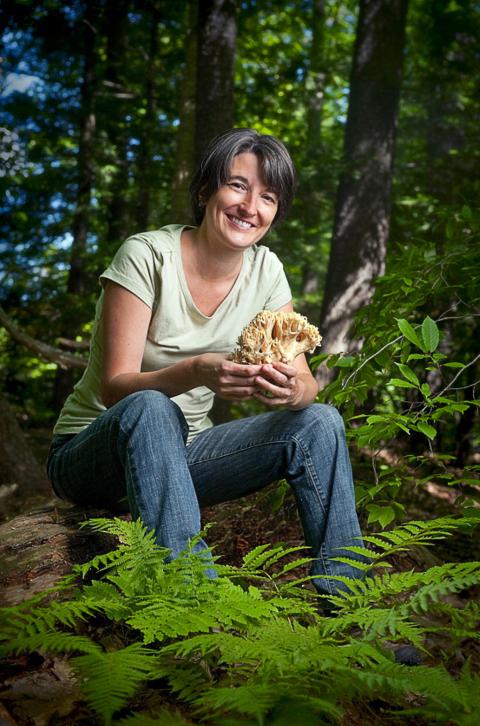Outstanding Faculty Award - Associate Professor, 2011
Natural Resources and the Environment

Serita Frey understands that soil microbes—primarily fungi—have an image problem. They’re dirt, after all, and the marquee member of the group is the mushroom, hardly a dolphin or polar bear in terms of charisma. “To bubble over about soil organisms is not easy for me,” she says.
But Frey, emerging as an international leader in the field of soil microbial ecology, urges those who would turn up a wrinkled nose at fungi to consider this: Without fungi working their decomposition magic in the Northeast’s forests, we’d be buried in leaves.
Frey has devoted her research to ensuring that soil microbes can continue this important work in the face of human-caused stressors like climate change and nitrogen deposition.
She and her collaborators, who include UNH Provost and Professor John Aber, have found that nitrogen suppresses soil microbes. “What we’re seeing is a decline in the ability of the soils to cycle nutrients, along with an accumulation of carbon,” says Frey.
“Serita’s research is vital for environmental management, because it provides insights into the effectiveness of soils as carbon ‘sinks’ that offset the impact of rising atmospheric carbon dioxide,” says Professor of Environmental Science and Presidential Chair William McDowell. McDowell lauds Frey’s innovation in the classroom as well; recently she received a USDA grant to develop a “studio soils” class, tapping an active-learning format that’s become popular in physics but is relatively untested in biological sciences.
“In the last ten years there’s been much more recognition of the importance of soil microorganisms. I like to think I’ve played some small role in that,” she says, adding, “I feel like I’ve turned a lot of students onto soils who didn’t realize how cool and important it is.”
—Beth Potier
About This Award
The ideal university faculty member is someone whose accomplishments in the areas of teaching, research, and service are prodigious and of the highest quality. He or she is an inspiring, challenging, and effective teacher, whose concern and respect for students is evident both in and out of the classroom. Such a faculty member makes important and extensive contributions to his or her chosen field, and shares those contributions with peers through publication or other appropriate means. Finally, the ideal faculty member willingly and effectively devotes time and energy in useful service to the university, the profession, and the state. The recipients of these awards are those members of the university faculty who, in recent years, have demonstrated these qualities. Each year, two Outstanding Faculty Awards will be given, one each for an assistant and an associate professor. All UNH tenure track faculty members at those ranks are eligible.